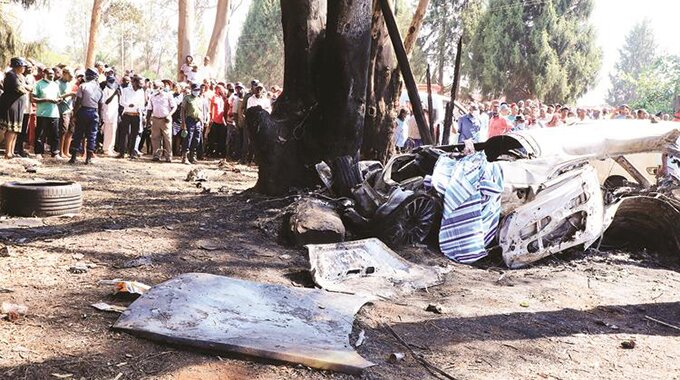INTERVIEW: BLESSED MHLANGA
MDC vice-president Tendai Biti (TB), who during the inclusive government era, served as Finance minister speaks to NewsDay (ND) senior reporter Blessed Mhlanga on the failing Zimbabwe dollar and other issues. Below are the excepts from the interview.
ND: Business is now resisting the bond notes or the local currency in favour of the United States dollar, do you subscribe to this?
TB: I don’t blame them – why would anyone accept a currency that is valueless? I don’t blame businesses, I fully understand where they are coming from and it only makes logical sense that they are fighting back.
ND: What is the solution? It seems the government insists that it will be bringing penalties on businesses that refuse to accept the local currency?
Advertisement
TB: That doesn’t help, you can’t criminalise rational behaviour. Right now, 90% of Zimbabweans are buying foreign currency on streets. There is no amount of teargas; there is no amount of gun, tank that is going to stop that because a human being behaves rationally — he will protect himself (or herself). So when you make irrational decisions, the market responds in a different manner. The market and the people respond in a rational manner and that’s what they are doing. No amount of law can stop that. The solution is simple – to repeal Statutory Instrument (SI) 142 of 2019, SI33 of 2019 and bring back the regime of multiple currency.
ND: There are some who argue that Zimbabwe has enough foreign currency reserves and getting about US$7 billion every year and the only reason why there is a shortage is because of corruption, is this a correct assessment?
TB: No, there are two things. First, there is one expansionary fiscal policy. If you read the Parliamentary Public Accounts Committee report on the Reserve Bank of Zimbabwe, we concluded that the shortage of US dollars was caused by the RBZ which took US$5 billion worth of people’s money from banks to finance an expansionary fiscal policy. The first thing is, government is overspending, living outside its means: Fiscal indiscipline. Secondly, is, of course, looting, particularly through the Command Agriculture programme because billions are being taken and siphoned outside the country. The US dollars we adopted in 2009 never came from the government, they never came from the market, so the forex that people will use if the hard currency is legalised again will not come from the government; the market will sort that out.
ND: Do you see a situation where Zimbabweans, like in 2009, will force the government to adopt multi- currency again?
TB: The market has already redollarised. In 2009, what the government simply did was to only recognise the de facto dollarisation that had taken place; so here (President Emmerson Mnangagwa …. and (Finance minister) Mthuli Ncube, will resist, but the market has redollarised already, that is why your first question to me was business is refusing local currency because the market has already dollarised.
ND: If government does not act before the market redollarises fully, what challenges would they face?
TB: It’s already facing them. Look at the huge queues for fuel, the massive shortage of power, the massive shortage of basic commodities; look at social crisis, the closure of hospitals and schools, inflation, growth in money supply over 300% from January to October 2019, so the government is already feeling the effects of the mad decision of introducing a currency when conditions did not exist that can sustain a local currency.
ND: What are the conditions that were supposed to exist?
TB: There has to be productivity in the economy. Last year’s growth rate was -14% and this year growth rate will be around -12%. There has to be a positive current account. We have to have a current account surplus, yet we have a current account deficit that is almost 15% of (gross domestic product) GDP. So to every dollar that comes in the country as export earnings, $5 is going out in the form of imports. We need some foreign currency reserves, here we have nothing, we have US$2 million of foreign currency reserves which does not last half a day.
Most importantly, we need to have political confidence, without a political solution you can’t bring your currency. What you are seeing on currency is a people who have rejected a government and that is then reflected in the economy, so when they are afraid to demonstrate and go in the streets they will then turn that on the economy. That’s why we always say you can rig the election, but can’t rig the supermarket, you can’t rig the gas station and that is what’s happening now.
Advertisement
ND: That government has partially accepted other players to charge in foreign currency for instance, Zimra to collect revenue in foreign currency, what effect does it have on the economy?
TB: If you look at the Financial Bill number three of 2019 or the 2020 budget statement, three quarters of the revenue measures that were passed in the Finance Bill, government legalised and authorised itself to collect tax in US dollars, whether VAT (value-added tax), capital goods and levies and duty or any form of tax. It’s madness that you pauperise others, but you are trying to protect yourselves by continuing to collect and legalise the US dollar, that’s the madness of this regime. So, we effectively have four currencies, the US dollar which is legal in certain sectors and multi-currencies which are not illegal for all of us, then we have EcoCash, then you have the bond note, then we have the RTGS. What kind of country is that?
ND: Is this even legal that government pays its workers in local currency, but it demands taxes in foreign currency?
TB: The rationality or irrationality of what they are doing needs to be tested in a Constitutional Court and I’m surprised that so far there has been no constitutional application that has been filed to challenge SI 33, to challenge SI 142 to challenge government’s irrational behaviour.
ND: You have in the past led fights against irrational behaviour, why have you not in this instance?
TB: I am waiting for clients, I cannot be the applicant in this case, someone must come forward and I will represent him or her free of charge.
ND. As the MDC, what are your plans to ensure that all these problems go away?
TB: First and foremost, there has to be a political solution to deal with the crisis of legitimacy. Secondly, and most importantly, as a matter of urgency, there has to be official re-dollarisation of the economy by repealing SI 142 and SI 33. There has to be macro-economic stability and government must leave within its means. There has to be a regime of positive rates of interest; that is very key.
Productivity – there has to be productivity, industries must start functioning; farms must start functioning; factories must start functioning and all these will require serious policy measures. For instance, in agriculture title deeds have to be given to people who own land so that they can borrow money and use their land as an asset. With industry, for instance, there has to be an industrial revival fund, there has to be an ease of doing business, there has to be attraction of foreign direct investment. So a lot of things have to go into productivity, incentives have to be given for the informal sector to become formal, for small-to-medium enterprises to become decent sustainable industries; so it’s productivity and productivity.
Most importantly, Zimbabwe has to grow a savings culture. It is a crime that in less than two decades, this government has destroyed people’s savings, pension funds through economic policy mistakes. One was the crisis of 2008, now it’s the crisis of 2019/20 caused by the de-dollarisation of the economy. But without savings, a country cannot move. We have to resolve the country’s debt crisis because as long as there is a debt overhang, Zimbabwe remains a high risk premium and also we can’t access the huge amounts of money that are sitting at the World Bank, the IMF (International Monetary Fund) and the Africa Development Bank because we have got debt. We must attend to infrastructure urgently, in particular electricity – power. You can’t produce without electricity.
That means that in the short-term, we have to use monetary measures to deal with the crisis. We have to allow dollarisation so that Zesa can charge in US dollars and, but the energy from Eskom or HCB (Hydroelectric of Cahora Bassa) or any other source using foreign currency. Then Zesa itself must embark on a massive programme of alternative energy and we have to create an additional 2 000 to 4 000 megawatts (MW) of new power and this includes completing Hwange 7 and 8, building Batoka which can generate 2 000MW, but we have to share with Zambia, meaning that we will get 1 000MW. This includes issuance of licences to independent power producers, particularly people like Rio Tinto and their co-projects Sinamatella, Dete in Manicaland.
Advertisement
Infrastructure is important, particularly as the enablers of production, energy, roads — look at the state of the Harare-Beitbridge and the Harare-Chirundu roads. Harare-Beitbridge in a normal country that road would have been shut down because it’s a graveside not a road. Infrastructure is so important, then, of course, modernisation – some countries are now using 5G, we are living in the internet age so a lot has to be done. And, of course, social services – hospitals have to function and these things need to be done urgently by a decent, clean energetic government, a transformational government; of which Mnangagwa is not one, so in short we need a democratic developmental State and Zanu PF is not capable of doing that.
ND: But Mnangagwa said he has ended austerity and he’s working towards productivity, how can you say he is not the right man to sort out this problem?
TB: Firstly, austerity hasn’t finished. On Wednesday (last week), the government gazetted the minimum wages for domestic workers at $160, that’s like $8 or so. That is ridiculous. They are still cutting expenditure from public hospitals — go to public hospitals, they are literally shut and doctors are being paid by someone else so that’s austerity. Most importantly, without addressing the fundamentals, we can’t move to productivity. So which person is going to put big money in Zimbabwe when we have such a skewed monetary policy? So he hasn’t started and he will never start because we have two people who are totally clueless — Ncube and Mnangagwa.
– NEWSDAY








